| Srl | Item |
| 1 |
ID:
124766
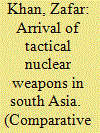

|
|
|
|
|
| Publication |
2013.
|
| Summary/Abstract |
This article examines the arrival of Tactical Nuclear Weapons (TNWs) amid the rapid arms race in South Asia. It analyzes the stability and instability prospects linked to the arrival of and dependence on TNWs. It states that TNW is a murky term that confronts a definitional issue. Although TNW has not been used yet, it entails the risk of its use on the battlefield in the event of a limited war. Conceptually, this sets the stage for an interesting debate on whether or not the arrival of TNWs is stabilizing for the South Asian region, which has confronted many wars and minor border skirmishes during pre- and post-nuclear periods. Since it is viewed that a possible limited military escalation to a nuclear level may not be ruled out and the arrival of TNWs has become a reality, the article concludes that a centralized command and control system bolstered with the non-deployed deterring posture of TNWs is the immediate solution to avert the related worries of pre-delegation, force protection, and the use-or-lose dilemma. It is expected that, learning from their nuclear predecessors, the South Asian nuclear leadership would practice restraint, remain rational, and call for the need of political trust and military reassurances to avert nuclear weapon use.
|
|
|
|
|
|
|
|
|
|
|
|
|
|
|
|
| 2 |
ID:
124784
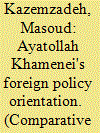

|
|
|
|
|
| Publication |
2013.
|
| Summary/Abstract |
This article analyzes the beliefs and patterns of behavior of Iran's Supreme Leader Ayatollah Ali Khamenei in regards to the nature of politics, political conflicts, and the role of agency in shaping events, strategy, and tactics. To do so, it discusses Khamenei's personal background, ideological formation, personality, and foreign policy statements.
|
|
|
|
|
|
|
|
|
|
|
|
|
|
|
|
| 3 |
ID:
124765
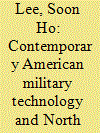

|
|
|
|
|
| Publication |
2013.
|
| Summary/Abstract |
Protected by networks of hard and deeply buried facilities, North Korea's asymmetric warfare assets have emerged as a real threat to the U.S.-Republic of Korea (ROK) alliance. As a solution, the U.S.-ROK alliance has developed military technologies to defeat North Korea's hard and deeply buried targets (HDBTs). However, questions remain regarding the efficiency of those technologies. By examining the contemporary status of North Korea's HDBTs and U.S. military technologies, this article proves that these newly developed military technologies are not very effective and that heavy reliance on technology is not a viable solution to North Korea's HDBTs.
|
|
|
|
|
|
|
|
|
|
|
|
|
|
|
|
| 4 |
ID:
124783
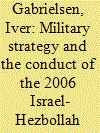

|
|
|
|
|
| Publication |
2013.
|
| Summary/Abstract |
This article examines the military strategies employed during the 2006 Israel-Hezbollah War and assesses the political war aims based on the outcome of the war. The assessment argues that the Israeli Defence Forces (IDF)'s strategy could not realistically attain Israel's strategic aims because the IDF struggled to translate tactical successes into strategic gains. Hezbollah's strategy more effectively matched the war's conduct and enabled it to attain more, albeit limited, war aims.
|
|
|
|
|
|
|
|
|
|
|
|
|
|
|
|
| 5 |
ID:
124785
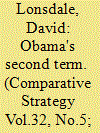

|
|
|
|
|
| Publication |
2013.
|
| Summary/Abstract |
President Obama's policy toward nuclear weapons has seriously undermined the flexibility and credibility of U.S. nuclear strategy. As a consequence of its desire to provide leadership on nuclear abolition, nuclear strategy under the Obama administration is shallow and unconvincing. This article seeks to put strategy back at the center of discourse on U.S. nuclear weapons policy. In this endeavor, and in contrast to Obama's stated stance, this article resurrects some important elements of Cold War strategic thinking on the subject. Warfighting, nuclear bargaining, and escalation dominance are particularly worthy of renewed attention.
|
|
|
|
|
|
|
|
|
|
|
|
|
|
|
|
| 6 |
ID:
124782


|
|
|
|
|
| Publication |
2013.
|
| Summary/Abstract |
Since the beginning of the twenty-first century, two new threats have received increased attention: biological warfare (BW) and cyber warfare. While it may appear that these two threats have little in common, they share several characteristics that have significant implications for international security. This article examines the two modalities side-by-side to review these common characteristics. In light of these commonalities and due to the extensive experience and rich history of dealing with BW threats, strategies for enhancing cyber security could advance more quickly by drawing meaningful insights from the biological warfare experience, such as the prospect of developing constraining international norms.
|
|
|
|
|
|
|
|
|
|
|
|
|
|
|
|